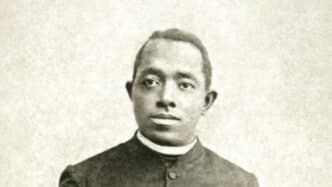Is laughter good medicine? Maybe, but it’s rare that we hear about the laughter of a saint. In our current historical moment, I think we need a saint’s laughter.
In July, we’re celebrating 31 days of St. Ignatius of Loyola, leading up to the anniversary of his death July 31, 1556. People who love Ignatius are always celebrating the important times in his life.
In 2021, we observed a “cannonball year,” commemorating the 500th anniversary of this soldier, then known as Inigo, being severely wounded by a cannonball from the French forces at Pamplona. His long recuperation led to conversion. A man who had dreamed of battlefield glory and winning ladies’ hearts became the man who founded the Society of Jesus (Jesuits) and became one of our greatest saints.
But in all the reading I’ve done on Ignatius I’d never heard about laughter. Maybe I’m caught in plaster statue sainthood mode — keeping saints on those pedestals is serious business.
So, reading a book of selected works by and about Ignatius, I came across this line, written by his companion and first-generation Jesuit, Jeronimo Nadal: “Those who were in his room,” wrote Nadal, “were continually laughing.”
I’ve been in Ignatius’ original office rooms in Rome, and was privileged to attend a Mass with a small group in the room where Ignatius himself celebrated Mass and later died. There, Ignatius’ own well-worn shoes are displayed.
Living the Jubilee Year of Hope
Hearing that Ignatius’ rooms were full of laughter is a good reminder at a time when so many Americans are feeling anxious. We are, after all, in a Jubilee year of hope. We are Pilgrims of Hope. But I, like many, struggle with hope.
Recently, I saw a post on social media about a man named Carlos who appeared at immigration court, accompanied by two Jesuits and a religious sister. He was following the legal process of seeking asylum but was whisked off by masked people purporting to be ICE employees.
The responses to the post were intense. “I live every day in a state of outrage and grief,” wrote one poster. “I am very distraught,” wrote another. Posts continued to pour out deep angst.
This is the America where immigration enforcement has been awarded more money than the military budgets of many countries, where officials smile as they tour “Alligator Alcatraz,” a new prison for refugees in Florida.
Archbishop Broglio, president of the U.S. Conference of Catholic Bishops, lamented the “great harm” the recently passed “Big Beautiful Bill” will cause to many of the most vulnerable in our society, including migrants.
None of this, of course, is a laughing matter. Yet when we find ourselves distraught and grieving, we remember that, as Christians, we’re called to hope and to joy. How?
Finding laughter
Ignatius, too, lived in tumultuous times. The Protestant Reformation roiled Europe. Plague swept through cities intermittently. Henry VIII abandoned the Church for a second marriage. The Renaissance flourished and with it challenging new ideas.
Somehow, Ignatius, who called himself “the pilgrim,” kept his eyes on God.
I remind myself that we pilgrims of hope cannot solve all the world’s problems. We aid our neighbors when and where we can. We remain active politically. We avoid obsessing over the news. We focus on the positive, the helpers, the good around us.
Notice Nadal refers to “those who were in his room.” We seldom laugh robustly by ourselves. Laughter is a communal event, something we do best together. Community has never been more important than it is right now.
Join friends to celebrate. Find laughter. Then, pilgrim, joyfully wear out your own shoes for the Lord.







